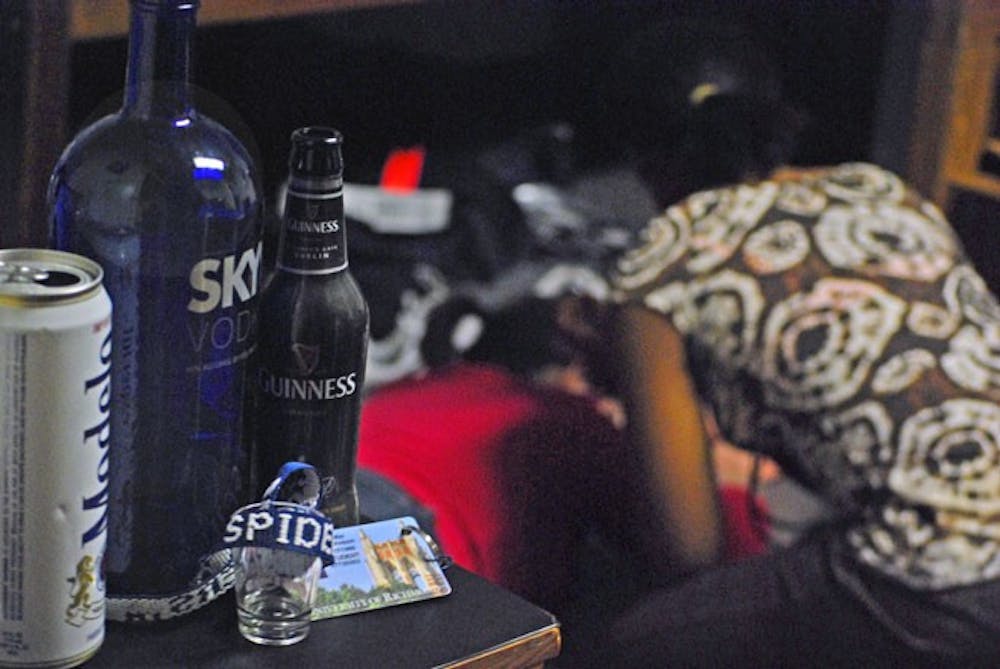A policy that would allow students to call 911 in alcohol-related emergencies without fear of certain school sanctions was approved by both Westhampton and Richmond College government associations and will be reviewed by administrators in the coming weeks.
"As it stands," said Elle Carabetta, WCGA president, "if you're a student and you think your friend has to go to the hospital for alcohol, there may be a fear [of being] reported to the dean, or paying for ambulance and medical fees, then having to tell your parents about going to the hospital. Then you can get fines, community service and alcohol education and the situation goes on your record."
These fears might keep students from calling for help if they know their friends will get in trouble, she said.
The policy would be an extended version of the "Good Samaritan" policy already in use on campus, said Joe Boehman, dean of Richmond College. The policy insists that students call emergency services when a friend is in need and that the callers will not get in trouble. The new proposal, tentatively called a medical amnesty policy, would try to reduce the consequences for those who need to go to the hospital for alcohol-related ailments.
The policy was introduced by Gabriel Gigliotti and Joseph Wilding, who are both emergency medical technicians, on behalf of a student emergency research committee. It was also supported by an Interfraternity Council petition. The proposal was based in part off of similar policies at 93 other American universities and inspired by stories from UREMS about student EMTs receiving calls on their personal cell phones from people who needed help but didn't want to be written up.
"We are going to make appropriate changes," Boehman said. "Even if one student [doesn't call], then we need to make changes.
"But the policies will not touch the legal implications if you're underage [nor will it affect] the ambulance fees, hospital visit costs or whether your parents see that visit on their insurance. And it doesn't mean we won't talk to the student," he said.
Though the language Carabetta, Gigliotti, Wilding and Boehman used to talk about the policy differed, one thing they all mentioned was a greater emphasis on education. They not only want to make sure that students are aware of the policies set in place to help ill students, but also to help those who take drinking too far.
"If people don't know [the policy] exists, it doesn't do any good," Wilding said. "We just want to stop the hesitation students have when they ask, 'Should I call 911?' We want there to be a policy that tells them 'Yes, that's absolutely what you should do.'"
"It's not a 'get out of jail free' card," Wilding said. "You may not be getting the fines, but we're getting you education."
The proposal would probably include a limit to the number of times a student could go to the hospital or ask for medical assistance without a serious consequence, Boehman said. This would limit the possibility of abuse of the new system.
The biggest negative outcome of the new policy would be students misinterpreting it to mean that nothing will happen to them if they have an alcohol-related incident, Boehman said.
Enjoy what you're reading?
Signup for our newsletter
"If a student [with a serious drinking problem] believes that there are going to be zero consequences, then he might see a request from the deans to go home and get intensive help as a sanction when it's really not," Boehman said. "The best policy would [favor] personal responsibility on the part of everyone involved."
The policy will also need to be pointed and visible enough in the student community so that students will stop hesitating when they pick up the phone to dial 911, Gigliotti said.
"We want a policy that is strong enough for people to believe in, to know that they can call out for help," Gigliotti said.
Carabetta echoed that statement and said, "Some students may go to the hospital multiple times. But we're encouraging a medical [assistance] policy. It doesn't necessarily have to be [the one proposed by Gigliotti and Wilding]."
The policy, was inspired by worrisome stories from UREMS participants who found out that students were hesitating for minutes that could have meant the difference between their friend's survival or death. Carabetta, Gigliotti and Wilding all reminisced about their own stories or those of their friends.
"My greatest fear," Boehman said, "is that a student is dying from alcohol [poisoning] and not getting the help that they want."
Those worries will change something about the alcohol culture on this campus, according to Carabetta and Boehman.
"Obviously alcohol is around and will be around in the real world," Carabetta said. "Understanding how to use it is a life skill and it's the university's responsibility to teach that skill."
Contact staff writer Jordan Trippeer at jordan.trippeer@richmond.edu
Support independent student media
You can make a tax-deductible donation by clicking the button below, which takes you to our secure PayPal account. The page is set up to receive contributions in whatever amount you designate. We look forward to using the money we raise to further our mission of providing honest and accurate information to students, faculty, staff, alumni and others in the general public.
Donate Now



